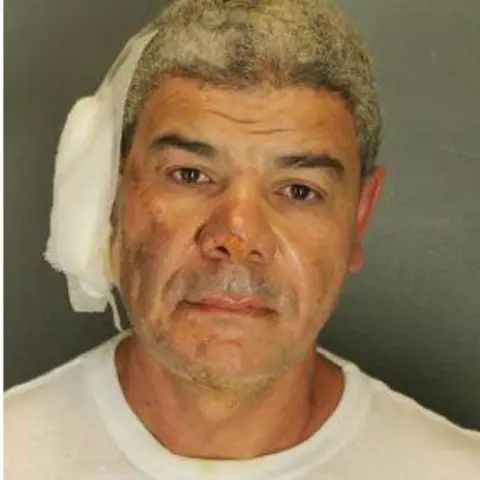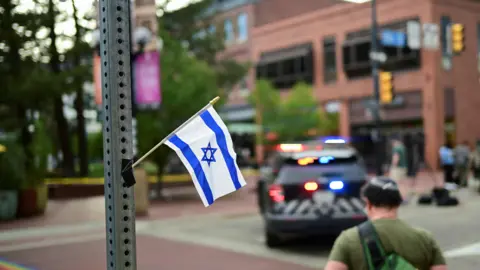What we know about the attack in Colorado
The FBI says an attack in Boulder, Colorado, that injured 12 people was a "targeted act of violence", and they are investigating it as an "act of terrorism".
Officials say the suspect planned the attack for a year, watching videos on how to make Molotov cocktails before driving from his home in Colorado Springs to Boulder to target a group gathering in support of Israeli hostages.
The suspect told police after he was arrested that he wanted to "kill all Zionist people", according to court documents.
What happened?
A group of people had gathered for a "regularly scheduled, weekly, peaceful event", which was organised by Run for Their Lives, an organisation that raises awareness for Israeli hostages still held in Gaza.
Officials said that a suspect threw two incendiary devices into the group of people, and used a makeshift flamethrower to attack them.
They identified the suspect as Mohamed Sabry Soliman, 45. Mr Soliman was taken to hospital shortly after the attack, the FBI said.
Near the scene of the crime, officials say they found 16 unlit Molotov cocktails in a plastic container within arm's reach, as well as a weed sprayer filled with petrol.
Police said they were "fairly confident" that they had the lone suspect in custody. There was no evidence the suspect was connected to a wider group.
"The suspect was heard to yell 'Free Palestine' during the attack," said special agent in charge of the Denver field office of the FBI, Mark Michalek.
He added: "It is clear that this is a targeted act of violence and the FBI is investigating this as an act of terrorism."
 Boulder Police Department
Boulder Police DepartmentWho is the suspect?
The suspect, Mohamed Sabry Soliman, has been charged with 16 counts of attempted murder, assault and possession of an incendiary device.
He has also been charged with a federal hate crime.
The 45-year-old is an Egyptian national who according to an arrest warrant lived in Kuwait for 17 years before moving to Colorado Springs three years ago.
The suspect told police in an interview after his arrest that he had planned the attack for a year and waited until his daughter graduated from high school, according to court documents.
He had allegedly watched YouTube videos on how to make Molotov cocktails and purchased the ingredients, picking up gasoline at a station on his way to Boulder - about two hours away from his home by car.
According to federal officials and the arrest warrant, Mr Soliman said he wished all Zionists were dead and that he wanted to conduct more attacks but got scared after throwing two Molotov cocktails at the group.
The suspect told police he found the Run for Their Lives group in an online search, and showed up five minutes before their meeting to wait for them, officials said.
Mr Soliman left an iPhone hidden in a drawer in his house with messages for his family, according to court documents.
In 2022, Mr Soliman arrived in California on a non-immigrant visa that expired in February 2023, the Department of Homeland Security said.
Tricia McLaughlin, an assistant secretary at the Department of Homeland Security, said in a post on X that the suspect "is illegally in our country" and had filed for asylum in September 2022.
Trump's deputy chief of staff for policy, Stephen Miller, said on X that Mr Soliman was given a work permit by the Biden administration after he had overstayed his visa.
Who are the victims?
There are eight victims, aged between 52 and 88. Four are women and four are men. All of them have been taken to hospitals with burns and other injuries. The injuries range from "minor" to "very serious".
The eldest of the victims is a Holocaust survivor, Rabbi Israel Wilhelm, the Chabad director at the University of Colorado Boulder, has told CBS.
Wilhelm described the 88-year-old as a "very loving person".
 Reuters
ReutersWhat is Run for their Lives?
Run for their Lives holds walking and running events around the world calling for the release of Israeli hostages held by Hamas, according to their website.
It says its events are not protests, but "peaceful walks".
Their website says there are currently 230 active groups around the world, with the majority in North America and Europe.
The groups meet once a week for a 1km walk wearing red T-shirts. They also carry national flags of the citizens who are among the hostages still held in Gaza.
The Run for their Lives Instagram account has more than 6,000 followers. Their Facebook group has more than 2,000 members.
The movement was started by a group of Israelis in California, but local events are "independently led", according to their website.
What is happening now?
Mr Soliman briefly appeared in court on Monday, where he was wearing a yellow jumpsuit and had a white bandage across his head.
He spoke from behind a glass wall, answering "yes" to questions meant to determine that he understood what was happening in the courtroom.
The next court hearing is scheduled for Thursday, where he will hear the several charges he faces and attorneys will discuss bail. Prosecutors are asking his bail be set at $10m (£7.4m).
The FBI is continuing its investigation, but is "not tracking any credible threats to the Boulder community at this time", Mark Michalek, special agent in charge of the FBI's Denver field office told reporters on Monday.
US Homeland Security Secretary Kristi Noem earlier said her department was working with "interagency partners, including the FBI", and would share more information when it becomes available.
How is the Jewish community responding?
Israel's foreign minister, Gideon Sa'ar, released a statement saying he was "shocked" by the incident, which he called "pure antisemitism".
The Jewish community in Boulder released a statement saying: "Our hearts go out to those who witnessed this horrible attack, and prayers for a speedy recovery to those who were injured... When events like this enter our own community, we are shaken."
This is the second high-profile attack on the Jewish community in recent days.
Two young people were shot dead outside a Jewish museum in Washington DC by a gunman who shouted "Free Palestine".
Data from the Anti-Defamation League suggests antisemitic incidents spiked to a record level in 2023 and again in 2024.
